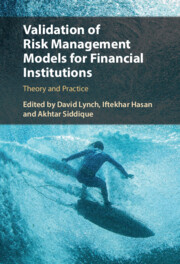Book contents
- Validation of Risk Management Models for Financial Institutions
- Validation of Risk Management Models for Financial Institutions
- Copyright page
- Contents
- Figures
- Tables
- Contributors
- Foreword
- Acknowledgments
- 1 Common Elements in Validation of Risk Models Used in Financial Institutions
- 2 Validating Bank Holding Companies’ Value-at-Risk Models for Market Risk
- 3 A Conditional Testing Approach for Value-at-Risk Model Performance Evaluation
- 4 Beyond Exceedance-Based Backtesting of Value-at-Risk Models: Methods for Backtesting the Entire Forecasting Distribution Using Probability Integral Transform
- 5 Evaluation of Value-at-Risk Models: An Empirical Likelihood Approach
- 6 Evaluating Banks’ Value-at-Risk Models during the COVID-19 Crisis
- 7 Performance Monitoring for Supervisory Stress-Testing Models
- 8 Counterparty Credit Risk
- 9 Validation of Retail Credit Risk Models
- 10 Issues in the Validation of Wholesale Credit Risk Models
- 11 Case Studies in Wholesale Risk Model Validation
- 12 Validation of Models Used by Banks to Estimate Their Allowance for Loan and Lease Losses
- 13 Operational Risk
- 14 Statistical Decisioning Tools for Model Risk Management
- 15 Validation of Risk Aggregation in Economic Capital Models
- 16 Model Validation of Interest Rate Risk (Banking Book) Models
- 17 Validation of Risk Management Models in Investment Management
- Index
- References
12 - Validation of Models Used by Banks to Estimate Their Allowance for Loan and Lease Losses
Published online by Cambridge University Press: 02 March 2023
- Validation of Risk Management Models for Financial Institutions
- Validation of Risk Management Models for Financial Institutions
- Copyright page
- Contents
- Figures
- Tables
- Contributors
- Foreword
- Acknowledgments
- 1 Common Elements in Validation of Risk Models Used in Financial Institutions
- 2 Validating Bank Holding Companies’ Value-at-Risk Models for Market Risk
- 3 A Conditional Testing Approach for Value-at-Risk Model Performance Evaluation
- 4 Beyond Exceedance-Based Backtesting of Value-at-Risk Models: Methods for Backtesting the Entire Forecasting Distribution Using Probability Integral Transform
- 5 Evaluation of Value-at-Risk Models: An Empirical Likelihood Approach
- 6 Evaluating Banks’ Value-at-Risk Models during the COVID-19 Crisis
- 7 Performance Monitoring for Supervisory Stress-Testing Models
- 8 Counterparty Credit Risk
- 9 Validation of Retail Credit Risk Models
- 10 Issues in the Validation of Wholesale Credit Risk Models
- 11 Case Studies in Wholesale Risk Model Validation
- 12 Validation of Models Used by Banks to Estimate Their Allowance for Loan and Lease Losses
- 13 Operational Risk
- 14 Statistical Decisioning Tools for Model Risk Management
- 15 Validation of Risk Aggregation in Economic Capital Models
- 16 Model Validation of Interest Rate Risk (Banking Book) Models
- 17 Validation of Risk Management Models in Investment Management
- Index
- References
Summary
This chapter focuses on potential issues bank examiners may face while reviewing the quality of a bank’s model risk management practices and validating modeling methodologies used to estimate allowance for loan and lease losses (henceforth ALLL). It discusses both leading and lagging practices in modeling and validating ALLL and examines upcoming challenges in implementing the new standards for allowance computations. In the context of validating ALLL methodologies under the new accounting standards, the author discusses the challenges in forecasting payoffs on existing credit card balances, issues relating to forecasting the economy and long-term losses, issues relating to the application of discounting in ALLL computations etc.
Keywords
- Type
- Chapter
- Information
- Validation of Risk Management Models for Financial InstitutionsTheory and Practice, pp. 295 - 330Publisher: Cambridge University PressPrint publication year: 2023

